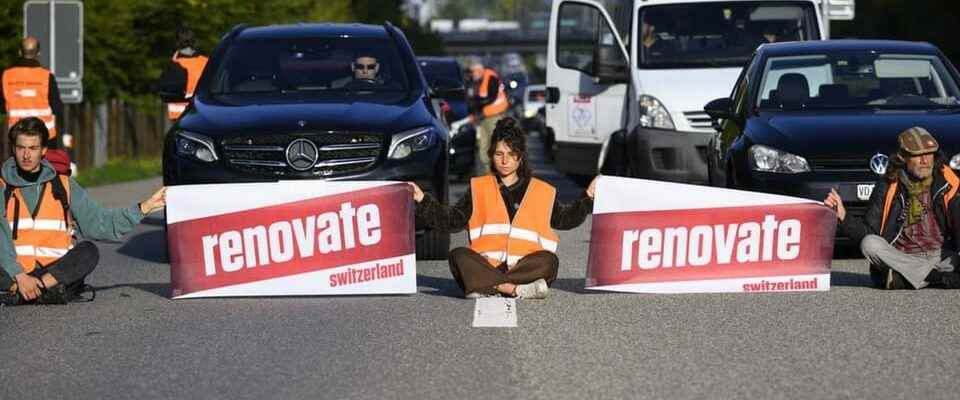contents
Road blockades on motorways or bridges, refusal of access in industrial companies – actions by climate activists are increasing. At what point do such actions become counterproductive?
Tuesday morning in Lausanne: climate activists block the Chauderon Bridge in the middle of the city. Saturday afternoon in Zurich: activists stick themselves to the ground on the Hardbrücke, paralyzing traffic. Monday morning in Cressier: activists block access to the oil refinery. Tuesday morning in Bern: activists demonstrated with a traffic blockade at the Bern-Wankdorf motorway exit for more climate protection.
Legend:
“Renovate Switzerland” is usually responsible for such radical actions.
Keystone/Archives/ LAURENT GILLIERON
Four actions within one week. Around a dozen such blockades have taken place in Switzerland since April. These campaigns are usually launched by the “Renovate Switzerland” group. According to its own statements, it is committed to ending dependence on fossil fuels. This is to be achieved with thermal renovations of buildings. The movement is demanding CHF 4 billion from the Federal Council for retraining in the construction industry.
Also controversial on the left
Civil disobedience actions, while attracting attention, are controversial. They are sharply criticized by the bourgeois side. This has been known for a long time. What is new, however, is that members of parliament from the ranks of the SP and the Greens are also observing the actions with skepticism – often behind closed doors.
With these actions you lose sympathy.
One person who does this openly is Basel SP National Councilor Mustafa Atici. He considers such radical actions harmful. The left-wing politician emphasizes that this is a way to lose sympathy. “We need everyone’s support on this issue.” The demands for stricter climate protection measures have arrived in politics, says the National Council. Especially in left-green governed cities like Zurich or Bern.
But it is precisely these cities where the blockades are often erected. Bern’s Mayor Alec von Graffenried (Greens) considers actions that want to shake things up to be fundamentally important. “But I’m amazed at the timing – right now this debate is in full swing.” Due to the energy crisis, Parliament finally passed long-awaited resolutions. “At the moment there is more movement in this topic than there has been for a long time.”
Important democratic tool
Actions such as road blockades often end with penal orders for those involved for coercion or trespassing. Anyone who resists this must answer in court. But the activists accept that.
Selina Lerch is one of them. There’s nothing else she can do. “I would also like to do something else – but we are in such an emergency that the political path is far too slow.” She is aware that the blockades disturb many people and are uncomfortable. “But if we don’t act now, we will soon be exposed to much greater violence.”
Non-violent actions and demonstrations are an important tool in a functioning democracy, says Helen Keller. She is a professor of public law at the University of Zurich and a former judge at the European Court of Human Rights in Strasbourg. “For minorities, they are often the only way to express their opinion.”

